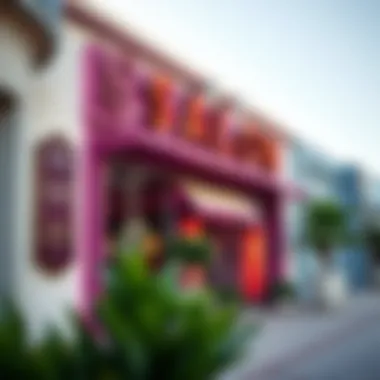Exploring the Salons for Sale Market in Dubai


Intro
Dubai's salon market presents a bouquet of opportunities for savvy investors and entrepreneurs alike. The ever-evolving city stands as a beacon for those pursuing ventures in the beauty and wellness industry. Understanding the ins and outs of this market is crucial, given its unique characteristics shaped by both local culture and international trends. This article aims to guide potential buyers through the rich terrain of salons for sale in Dubai, touching on vital aspects such as market trends, property types, legal considerations, and strategies for success.
The vibrancy of the salon landscape in Dubai isn't just about the treatments offered; it's a reflection of the diverse population, tourism influx, and a penchant for luxury services. With the right insights, both seasoned investors and newcomers can find their footing in this lucrative field. Let's dive in and explore the elements that shape this captivating market.
Understanding the Salon Market in Dubai
The salon market in Dubai represents a vibrant sector within the city's broader beauty and wellness industry. As this bustling metropolis grows, so does the demand for personal grooming and aesthetics. Investors and potential buyers need to grasp the nuances of this market to make informed decisions. Understanding the dynamics at play goes beyond just recognizing the appeal of owning a salon; it involves analyzing trends, consumer behavior, and competitive landscapes.
Gaining clarity on why this sector thrives in Dubai helps potential buyers appreciate the opportunities ahead. The interplay between tourists flocking to the city and the extravagant lifestyles of residents boosts the demand for salon services, creating an attractive investment proposition.
In essence, understanding the salon market is crucial for several reasons:
- Consumer Demand: With a culturally diverse population, Dubai garners interests ranging from traditional treatments to contemporary beauty innovations.
- Regulatory Landscape: Familiarizing oneself with the legalities around salon ownership helps in avoiding potential hurdles.
- Investment Opportunities: Knowing what's hot and trending gives a competitive edge.
Market Overview
Dubai’s salon industry is multifaceted. It encompasses various types of establishments, from high-end luxury salons catering to affluent clientele to more budget-friendly options that serve a wider audience. On the whole, the growth trajectory remains solid, driven by a blend of local residents and tourists seeking premium beauty services.
The market is increasingly fragmented, with a mix of local brands and international franchises vying for attention. This dynamism results in a continuous flow of new salon openings as well as some closures.
"Understanding the characteristics of the market can lead potential buyers to identify unique, lucrative opportunities within specific niches."
Additionally, the seasonal influx of tourists also plays a vital role. Many seek aesthetic treatments prior to major events or holidays, creating peaks in demand that must be strategically managed.
Key Trends
Several trends are shaping the salon market in Dubai. Keeping an eye on these developments can prove beneficial:
- Sustainability: Eco-friendly practices are becoming increasingly popular. Salons using organic products or environmentally conscious methods are not just appealing to a niche; they're becoming a mainstay.
- Technology Integration: From booking appointments online to adopting AI-driven systems for personalized services, tech plays a prominent role in enhancing customer experience.
- Home Services: The rise of on-demand beauty services allows salons to reach clients in the comfort of their homes. This trend gained momentum during the pandemic and seems here to stay.
- Diverse Offerings: Salons are expanding their range of services beyond just hair and nails, venturing into wellness treatments such as massages and skincare, thus attracting a broader client base.
Being aware of these trends enables investors to tailor their approach when entering the market. Those who adapt quickly to changing consumer preferences are likely to thrive.
Types of Salons Available
Understanding the different types of salons in Dubai is critical for potential buyers. The salon landscape is vast and varied, catering to diverse clientele and offering numerous services. Each type presents its own set of benefits and challenges that must be weighed carefully.
Hair Salons
Hair salons are perhaps the most recognized type of salon in Dubai's beauty market. They cater to a broad demographic, providing services that can range from haircuts to intricate styling, coloring, and treatments. A potential buyer should consider the different segments of the hair salon industry. For instance, a high-end salon in Dubai Marina will attract a different clientele compared to a neighborhood shop in Deira.
Here are a few important factors to consider when looking into hair salons:
- Services Offered: Shall the salon promote specialty services like keratin treatments or traditional hair cutting? Thus, differentiating itself from competitors.
- Location: Being in a bustling area can boost visibility and foot traffic. Think about accessibility to parking and proximity to residential areas.
- Staff Expertise: A skilled team of stylists will be a massive draw, ensuring client retention and satisfaction.
Investors looking at hair salons should carefully review their current client base and potential for growth, thinking long-term about branding and service expansion.
Nail Salons
Nail salons represent another flourishing segment of Dubai's beauty market. The demand for manicure and pedicure services continues to grow, influenced by increasing attention to personal grooming. Nail salons provide a unique opportunity for buyers due to a relatively lower initial investment compared to larger establishments.
While assessing nail salons, consider:
- Service Variety: Offering not just basic nail care, but potentially trends like gel nails, nail art, or organic products can set a salon apart.
- Ambiance: The environment matters—an inviting and clean salon can lead to a loyal clientele, as customers often associate experience with the overall setting.
- Technology Use: Introducing reservation systems or digital payment options can enhance customer experience.
Beauty Clinics
Beauty clinics occupy a niche that combines aesthetics with medical expertise. These establishments often offer advanced skincare treatments, aesthetic procedures, and cosmetic procedures. The investment in beauty clinics often involves a deeper understanding of regulations and qualifications for practitioners.
When considering a beauty clinic, it’s crucial to evaluate:
- Regulatory Compliance: Ensure that the clinic meets all necessary health and safety regulations, including staff certifications.
- Market Demand: Investigate local competition and customer demographic. Are there enough interested clients willing to pay for premium treatments?
- Equipment Quality: High-quality machinery can significantly impact service effectiveness and customer satisfaction, making this a vital consideration.
Spas
Spas focus primarily on relaxation and wellness, offering services such as massages, facials, and body treatments. They have seen an increase in popularity, particularly post-pandemic, as people look for avenues of relaxation and self-care. Buying a spa can be a wise investment if the location is strategic and the service menu is appealing.
Key factors for spa operations include:
- Quality of Services: A warm atmosphere with skilled therapists can lead to repeat business. It is important that staff are well trained and provide exceptional service.
- Ambience: Spas often hinge their success on the tranquility of their environment, making design and decor crucial.
- Location Awareness: Similar to other salon types, proximity to hotels or high-income residential areas can enhance visibility and client flow.
In summarizing, identifying the right type of salon aligns directly with the target market strategy.


Each salon type has its unique characteristics and opportunities, requiring tailored strategies for successful ownership. By understanding the dynamics of each category, prospective buyers can make informed decisions in adapting to Dubai's thriving salon landscape.
Factors Influencing Salon Prices
Understanding what drives the cost of salons is crucial for any potential buyer. Several elements play a role in determining prices, and familiarizing yourself with these will equip you to make informed decisions in your journey of acquiring a salon in Dubai.
Location
The location of a salon can make or break its business. A high-footfall area, such as a bustling shopping mall or a popular street, can significantly inflate the price of a salon. Here, customers are abundant, leading to steady revenue—something investors can't overlook. A salon situated in an upscale neighborhood will likely fetch a higher price than one in a less desirable area.
Furthermore, consider the demographics of the location. Areas frequented by expatriates might lean toward specific services, making such salons more lucrative. Not only does the location affect customer inflow, but it also impacts competition. A vibrant locale pint-size with other salons may force prices down, whereas a less saturated area might still command a premium due to the exclusivity of services offered.
"The right location can propel a salon from average to luxurious; it's where convenience meets clientele."
Size and Layout
When it comes to buying a salon, size never lies. Larger spaces typically cater to more clients and offer broader service capabilities. However, buyers should also focus on the layout. An efficiently designed salon increases productivity. If the space is well-organized, with designated areas for hair cutting, coloring, and styling, it can enhance customer experience and operational flow.
An awkward layout, on the other hand, could deter clientele—even if the space is sizable. Buyers should be attentive to the balance of serving capacity versus the actual usability of the salon space. A compact, yet well-structured salon in a premium location might carry more value compared to an expansive space that’s poorly arranged.
Equipment and Inventory
A salon’s inventory, including furniture, tools, and products, is an essential component influencing its price. High-quality equipment can fetch a better sale price, particularly if it's well-maintained and relatively new. The rise of organic and natural beauty products has shifted consumer preferences, making it crucial for salons to stay updated with inventory that reflects these trends.
Also, the cost of inventory adds another layer. Investing in classy furnishings or sophisticated equipment like scalp treatment machines may increase upfront costs, but it can also enhance client satisfaction and loyalty. Potential buyers should pay close attention to the salon's current inventory and equipment condition—this not only affects purchase negotiations but also the long-term profitability of the business.
In summary, comprehensively evaluating these factors will lead to a smarter investment. Pricing does not simply boil down to a singular aspect, but rather a multitude of interconnected elements that create the salon's overall worth in the thriving but competitive Dubai market.
Legal and Regulatory Considerations
In the bustling beauty landscape of Dubai, understanding legal and regulatory considerations is not just a formality; it’s a critical piece of the puzzle when exploring salons for sale. The implications of these factors can determine not only the feasibility of a purchase but also the long-term success of a venture. With a landscape as competitive as Dubai’s, being on the right side of the law can set one apart from the rest.
Business Licensing
First things first, business licensing is essential for operating any salon legally in Dubai. The local authorities require a specific set of licenses for beauty establishments to ensure compliance with standards tailored to the salon industry.
When purchasing a salon, it’s imperative to verify that the existing licenses are up to date. This includes:
- Commercial Trade License: Necessary for conducting business.
- Professional License: Required specifically for beauty services.
- Municipal License: Ensures the establishment meets local regulations.
Failure to secure proper licensing can result in hefty fines or even closure of the business. An astute buyer will need to scrutinize the current license status and understand any regional regulations that might apply. Each emirate in the UAE can have slight differences in what is required, so it's wise to do your homework.
"Navigating the regulatory landscape of business in Dubai is crucial for laying a solid foundation."
This knowledge not only safeguards the investment but also ensures that operations run smoothly from day one. Various platforms like Dubai Economy provide an overview of licensing requirements, streamlining the research process for prospective buyers.
Health and Safety Regulations
Another key aspect of the legal scene in Dubai regards health and safety regulations. These regulations are particularly strict in the beauty sector, with the aim to provide impeccable service while ensuring wellness standards. Salons must adhere to a range of health protocols, including but not limited to:
- Sanitation Standards: Strict guidelines on equipment and facility cleanliness.
- Cosmetic Product Regulations: Need to use only approved beauty products that meet safety benchmarks.
- Staff Training: Requirements for staff to undergo regular training in hygiene practices.
Purchasers should ensure that the salon they're considering for purchase complies with all health and safety regulations. A thorough physical inspection can shed light on potential red flags that may not be immediately apparent. Knowledge of legal health codes not only builds consumer trust but also protects owners from potential liability issues.
In summary, navigating the intricate web of licensing and health regulations is paramount for anyone considering entering Dubai's vibrant salon market. By being proactive in understanding these legalities, buyers not only shield themselves from risks but also lay the groundwork for a successful business. By connecting with relevant local authorities or consulting resources such as The UAE Government Portal can provide additional, updated information related to regulatory standards in Dubai.
Financing Options for Buyers
Navigating the purchase of a salon in Dubai is as thrilling as it is complex. The right financing options can make or break the deal for many buyers. Understanding how to leverage financial resources is a crucial part of this journey, as it can define not just the feasibility of an acquisition, but its ultimate success.
Financing a salon purchase plays an influential role in the overall investment landscape. The options available range from traditional loans from banks to innovative investment partnerships. Each comes with its unique set of advantages and considerations.
Traditional Loans
When considering financing for a salon, traditional loans are often the first stop on the list. These loans offer the potential for larger sums than many buyers might be able to access through other means. Banks and credit unions provide these loans, typically requiring a solid credit history and a robust business plan to demonstrate the potential profitability of the salon.
- Interest Rates: Generally, interest rates for traditional loans are competitive, especially for those with good credit. This can lead to substantial savings over time, which benefits the buyer in the long run.
- Repayment Terms: Buyers can enjoy a variety of repayment terms, often ranging from five to 15 years. This flexibility allows for manageable monthly payments, freeing up cash flow for operational needs.
- Equity Building: One significant advantage of taking out a traditional loan is the potential to build equity in the business. As you pay down the loan, the ownership stake in the salon increases.
However, it’s not all sunshine. Buyers can face hurdles, such as:
- Extensive Documentation: Banks often require comprehensive documentation, which can be tedious and time-consuming to prepare.
- Risk of Debt: Mismanagement of finances or unforeseen market shifts can lead to financial strain, putting the business at risk.
In essence, while traditional loans offer substantial advantages, they may require a buyer to tread lightly, ensuring they’re fully prepared for the fiscal responsibilities that follow.
Investment Partnerships


On the flip side, investment partnerships present an alternative approach for salon buyers. This method of financing can foster resource sharing and bring additional expertise into the mix, which may enhance the overall business operations.
- Shared Risk: One of the most appealing aspects of investment partnerships is the shared risk. With multiple investors involved, the financial burden is lighter.
- Capital Injection: Partnerships can also facilitate more significant capital needs upfront. This can be particularly advantageous for renovations or more extensive upgrades needed to remain competitive in Dubai’s bustling market.
- Skill Diversification: Often, partners may bring specialized skills or experience, which can lead to innovative marketing strategies or operational efficiencies that a single buyer might not provide.
Nonetheless, potential partners must be chosen with care. Agreements should outline roles, responsibilities, and profit-sharing to prevent conflicts. Misalignment of objectives or miscommunication can lead to complications.
In summary, both traditional loans and investment partnerships have their merits and drawbacks. Buyers should weigh these options based on their financial standing, business acumen, and long-term aspirations for the salon. Ultimately, the right choice will resonate with the individual buyer’s goals and risk tolerance, laying the groundwork for their journey in the salon market.
Assessing Competition
Understanding the competitive landscape is crucial when considering the purchase of a salon in Dubai. The salon industry in this vibrant city is a unique tapestry woven with diverse players, each bringing their own strengths and weaknesses to the table. Assessing competition allows potential buyers to strategize effectively, ensuring they stand out in a crowded market. It’s not just about surviving; it’s also about thriving in an environment where customers have choices aplenty.
Identifying Key Competitors
A strategic first step in assessing competition involves identifying key competitors within the salon market. It’s important to look beyond mere names; understanding who your competitors are, what they offer, their strengths, weaknesses, and their unique selling propositions is pivotal. Here are aspects to consider:
- Local Market Leaders: Identify the top salons in your target area. What makes them appealing to customers? Are they known for specific services like hair styling, nails, or pampering treatments?
- Emerging Salons: New entrants can disrupt the market. These salons might target niche audiences. Are they utilizing Instagram influencers or unique product lines to draw attention?
- Customer Reviews: Websites such as Yelp or social media platforms are treasure troves of customer feedback. Compiling reviews can provide deep insights into what patrons appreciate or dislike about competitors.
By gathering information on these competitors, you can pinpoint gaps in the market and determine how to position your salon uniquely. It's about adapting and finding your niche rather than merely replicating what's already offered.
Understanding Market Share
Understanding market share provides a vital context for assessing competition. It offers insight into not just who the competitors are, but how much of the market they control. Market share can be understood through simple calculations and research:
- Gather Data: Look for industry reports or statistics about salon revenue in Dubai. Reports from organizations like the Dubai Economic Department or relevant studies available on britannica.com can shed light on overall market performance.
- Analysis: Calculate the market share of competitors by dividing the sales of each salon by total industry sales. This reveals which salons dominate and which ones are struggling.
- Trends: Are certain salons gaining market share? Or is there a trend of decline for others? Understanding these patterns can help forecast future movements in the market.
"A common mistake is thinking that entering a market where one feels competitive without understanding rivals is a sound approach. Knowing the landscape helps guide the business strategy effectively."
Evaluating Salon Condition
In the competitive landscape of Dubai’s salon market, evaluating the condition of a salon prior to purchase is a cornerstone of making a sound investment. This undertaking encompasses not only the physical aspects of the salon but also the operational capabilities it harbors. A thorough evaluation can spell the difference between a flourishing venture and a troublesome burden.
One must approach the evaluation process with a meticulous eye, keeping in mind that the first impression often does not tell the whole story. The condition of a salon can impact its profitability, reputation, and client retention. Thus, knowing what to look for and the benefits of a comprehensive assessment is essential for any serious buyer.
Physical Inspection
The physical inspection serves as the foundational step in evaluating a salon's overall condition. It entails an exhaustive examination of the premises, which includes assessing the structure, interior design, and hygiene standards. A clean and well-maintained environment is an implicit promise of quality service to potential clientele. Buyers should ask themselves:
- Is the floorplan efficient? Flexible layouts can enhance customer flow.
- What condition is the plumbing in? Water damage can lead to costly repairs.
- Are the walls and ceilings well-kept? Signs of pests or mold must be taken seriously.
- How up-to-date is the decor? Investing in modern aesthetics can attract more customers.
A well-executed inspection may also unveil hidden costs that would be otherwise overlooked, such as upcoming renovations or maintenance that the current owner has neglected. Furthermore, ensuring compliance with local health and safety regulations needs to be part of this scrutiny.
Equipment Status
The second aspect of evaluation lies in the status of equipment. Equipment in a salon, ranging from hairdryers to managers’ software systems, plays a vital role in delivering exceptional service. The condition of this equipment can directly correlate with operational efficiency and customer satisfaction. During this analysis, consider the following:
- Age of Equipment: Older equipment might not only be less efficient but also more prone to breakdown. Look for warranties or service history for major items.
- Functional Testing: If possible, check that each piece of equipment operates smoothly. Equipment that doesn’t function correctly can lead to decreased service quality.
- Inventory Validation: Ensure that the supplies used are in good condition and not nearing expiration, as this could reflect on the salon’s operational standards.
Ultimately, ensuring that the equipment is in optimal shape means the new owner can focus on expanding the business rather than making immediate replacements. Healthy equipment not only contributes to a smoother operation but also enhances customer experiences, setting the stage for sustained growth.
It’s crucial to remember that a salon is not just a physical space; it’s an ecosystem that relies on all components working in harmony. Neglecting the thorough assessment of these aspects can lead to unforeseen setbacks.
Engaging in a diligent evaluation of salon conditions—both physical and equipment—equips potential buyers with the necessary knowledge to make informed decisions and ultimately guides them toward a successful acquisition process.
Negotiating the Purchase
Negotiating the purchase of a salon in Dubai is often the turning point for potential buyers. This stage requires a careful approach where understanding the dynamics of the market can benefit a buyer significantly. The process of negotiating isn’t just about getting the best price; it encompasses the overall terms that can define the future success of the salon.
Determining Offer Price
The first step in negotiation is settling on an offer price. This is not merely a number; it requires thorough research and analysis. One effective strategy is to evaluate similar salons in the area. If a buyer intends to establish a foothold in Dubai's vibrant market, compiling a list of comparable salons is a sound approach. Factors such as size, location, and condition should drive the valuation. A significant part of the offer price determination lies in understanding how urgent the seller is to sell.
Moreover, access to relevant financial documents cannot be overlooked. This includes:
- Profit and Loss Statements: These documents provide insights into the salon's financial health.
- Revnue Trends: Analyzing revenue fluctuations can reveal peak seasons and potential downturns.
- Lease Agreements: Knowing how much time is left on a lease can influence negotiations; a place with a long lease may be more valuable than one with a short term remaining.
It's crucial to approach the offer price with confidence. If a buyer bases their offer on solid ground, it signals to the seller that they are serious and informed, which can lead to favorable negotiations.
Closing the Deal
The conclusion of negotiations lies in successfully closing the deal. This step can often feel like navigating a minefield, but keeping a cool head and knowing the end goal is vital. Before signing anything, both parties need to agree on the terms laid out during negotiations. A well-drafted sales agreement should clearly outline financial obligations, assets included in the sale, and responsibilities post-purchase.
Notably, involving professionals can lighten the burden. Real estate agents or legal counsel familiar with Dubai’s salon market can provide critical support in ensuring all bases are covered. It's also wise to remain flexible during this phase; sometimes compromises may pave the way to a smoother transaction.


It is during this time that both the buyer and seller should feel confident about the arrangement. In every negotiation, the right balance of assertiveness and respect can foster a long-term professional relationship. Furthermore, a buyer might want to include transitional provisions, allowing for a support period from the previous owner to help in a smoother takeover.
Remember, every successful negotiation is anchored in clarity and respect.
In summary, negotiating effectively blends research and interpersonal skills. By determining a fair offer price and carefully navigating the closing process, buyers stand a good chance of acquiring a salon that not only meets their investments aims but also places them on a path toward future success.
Post-Purchase Considerations
Once the ink is dry on the contract and you hold the keys to your new salon, the journey is just beginning. It's easy to get caught up in the excitement of ownership but focusing on post-purchase considerations is crucial for long-term success. Adjusting to your new role requires planning and foresight in areas like branding, staff management, and financial oversight.
Branding and Marketing
First impressions matter in the salon business. Establishing a strong brand identity is not just about standing out; it's about building customer loyalty. Your brand should reflect your services and resonate with your target audience. Think about your salon's mission, aesthetics, and the experience you want to offer.
- Visual Identity: Logos, color schemes, and decor should be consistent across all platforms. A well-designed logo helps to create a memorable image. Consider hiring a designer if you’re not confident in your own abilities.
- Online Presence: In the digital age, having a robust online presence is a must. Maintaining an informative website and active social media pages, like on Facebook and Instagram, can keep your customers engaged and help attract new ones. You can showcase before-and-after pictures of clients, run promotions, or share tips to foster a sense of community.
- Local Marketing: Don't underestimate local advertising—flyers, partnerships with nearby businesses, or participation in community events can help pull in foot traffic.
In this competitive landscape, staying ahead means adapting your marketing strategies continually. Testing different approaches will let you know what connects with your clients.
Staff Management
The human element of your salon is perhaps the most vital aspect. When you buy a salon, the existing staff comes with it, carrying their experience and established habits. How you manage them can make or break your salon’s reputation and success.
- Communication: Foster open lines of communication with your staff. Regular meetings to discuss goals or offer feedback provides them with a feeling of inclusion. A satisfied team often leads to satisfied customers.
- Training and Development: Invest in your team. Continued education on trends and techniques can ensure that your services remain top-notch. Encouraging attendance at workshops or classes not only benefits the salon’s reputation, but also boosts employee morale.
- Establishing Roles: Clearly defined roles and responsibilities help in creating an organized environment. Staff should know what is expected of them and have a path if they seek advancement within the salon.
Financial Management
Understanding the financial side of your salon can be like navigating a maze. Successful salon ownership is as much about managing money as it is about providing excellent services.
- Budgeting: Create a solid budget. Outline your fixed and variable costs and make adjustments as needed. This helps in predicting cash flow and managing expenses.
- Record Keeping: Keep meticulous records of income and expenditures; software such as QuickBooks or FreshBooks can simplify this process. Having digital records can save time and offer insights that help in making informed decisions.
- Pricing Strategy: Regularly assess your pricing in relation to industry standards and competitor offerings. Ensure your pricing reflects the quality of services offered and adjust as necessary based on customer feedback or changing market conditions.
Ultimately, understanding these post-purchase elements can mean the difference between a flourishing salon and a struggling one. Attention to branding, staff dynamics, and a sound financial strategy will pave the way for success in the vibrant market of Dubai salons.
Potential Challenges and Solutions
Navigating the landscape of buying a salon in Dubai is not a stroll in the park. There’s a plethora of challenges lurking around every corner, and knowing how to address them can mean the difference between thriving or simply surviving. This section offers a closer look at two critical issues: market saturation and economic fluctuations. By understanding these challenges, potential buyers can better arm themselves with tools and strategies that will help pave the way to a successful acquisition.
Market Saturation
When considering the salon market in Dubai, one can't help but notice the sheer number of establishments that are vying for attention. The salon industry is increasingly competitive; many newcomers think they can just hang out a shingle and that’ll be enough to attract customers. However, it’s not that simple.
Market saturation indicates an abundance of salons relative to the potential customer base, leading to intense competition. This scenario drives down prices and can squeeze profit margins.
Key factors to consider include:
- Location: Not all areas are equally saturated. Some neighborhoods might have far too many options, while others might be underrepresented.
- Unique Selling Propositions (USPs): Salons need to stand out. Offering specialized services or a unique atmosphere can entice clients.
- Customer Experience: In such a crowded space, it's vital that customers have a memorable experience, as word-of-mouth can be a powerful marketing tool.
“In a saturated market, it's not just about offering services. It’s about creating an experience that customers want to return to.”
To mitigate saturation risks, buyers should conduct comprehensive market research. This includes analyzing demographics, customer preferences, and competitors’ performance. Being well-informed can help investors spot under-served niches or identify opportunities that others might overlook.
Economic Fluctuations
Economic conditions also shape the landscape within which salons operate. Every investor should keep an ear to the ground regarding economic fluctuations, as they can drastically influence business performance. When economic downturns occur, discretionary spending often takes the biggest hit, which can be detrimental to salon revenue.
Factors to watch for include:
- Consumer Confidence: People might tighten their belts during tough times, leading to reduced spending on non-essential services, including beauty treatments.
- Investment Trends: Economic growth can correlate with increased investment in luxury services, boosting salon revenues in upscales areas.
- Local Demand: Understanding the economic climate of the specific region within Dubai is crucial. High end areas might weather downturns better than others.
To navigate through the choppy waters of economic fluctuations, adaptability is paramount. Salons could consider diversifying their offerings or adjusting prices to maintain revenue without alienating existing customers. Moreover, staying informed about global and local economic forecasts can prepare investors to anticipate market changes and adjust strategies accordingly.
Future Trends in the Salon Industry
The future of the salon industry in Dubai, and globally for that matter, is not only an intriguing topic but also pivotal for anyone serious about entering this vibrant market. As consumer needs and technologies evolve, keeping abreast of future trends can give investors, homebuyers, and developers an edge over competitors. Ignoring these trends can lead to missed opportunities or, worse, drastic declines in business performance.
The following sections will break down critical developments shaping the salon industry. Understanding these elements can help potential buyers make informed decisions and strategize for long-term success in an ever-changing landscape.
Emerging Technologies
The salon landscape is undergoing a substantial shift, driven largely by technology. From advanced booking systems to AI-assisted solutions, technology is reshaping how salons operate. Consider the rise of online booking platforms like Treatwell and Fresha, which allow clients to reserve their appointments with just a few clicks. Salons can forget about the complicated phone calls; with these platforms, users can see real-time availability and book instantly.
Moreover, technological advancements are also impacting salon equipment. For instance, smart hair styling tools equipped with sensors can adjust settings according to hair type, helping professionals deliver personalized service. This is not just a fad; such technologies lead to better customer satisfaction, as results improve and styling becomes more efficient.
Consumer Preferences
Alongside technological innovations, consumer preferences shift like the sands of the Dubai desert. Today’s clients are more discerning than ever, with a keen eye for quality and convenience. The ever-growing trend towards eco-friendly products means salons offering sustainable, organic beauty products can expect to capture a loyal clientele.
There's also an increasing trend toward specialization, with customers seeking salons that focus on particular treatments—whether that's organic hair color, advanced skincare, or bespoke nail art. Personalized services in an intimate setting resonate with modern consumers looking for authenticity in their beauty experiences.
On the flip side, the post-pandemic world has subtly shifted the way people view salon visits. Safety measures have become a standard expectation rather than an extra. Salons that prioritize cleanliness and customer safety will likely stand out in the competitive landscape.
In summary, the future of the salon industry in Dubai hinges on adapting to technological changes and evolving consumer desires. Failure to recognize these elements may result in unfortunate outcomes for business owners unaware of the ever-changing marketplace.















